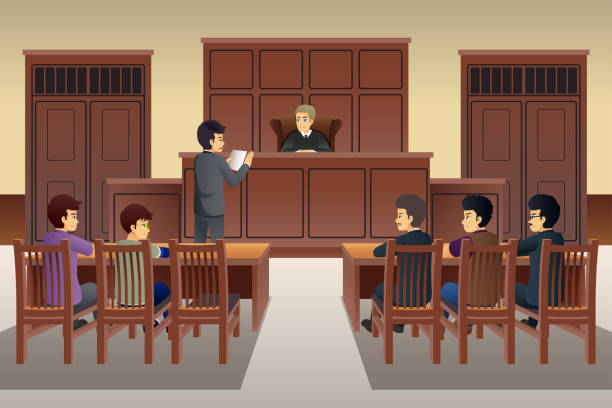Understanding Your Rights: Accessing Court Interpreter Services in Legal Proceedings
In legal proceedings, the presence of a court interpreter is not just a convenience, it's a critical component for justice.
Imagine a scenario where 21.6% of U.S. residents speak a language other than English at home. This statistic underscores the essential role of court interpreter services in ensuring fair and accessible legal processes for all.
Recognizing this, interpreter schedulers have become invaluable in our increasingly global business environment, streamlining the process of providing the necessary language support.
 Whether you're a defendant, plaintiff, witness, or simply an interested party, understanding your rights when it comes to accessing court interpreter services can significantly impact the outcome of your case.
Whether you're a defendant, plaintiff, witness, or simply an interested party, understanding your rights when it comes to accessing court interpreter services can significantly impact the outcome of your case.
In this comprehensive guide, we'll delve into the critical aspects of this essential service, ensuring you are well-informed and empowered when navigating the legal landscape.
The Role of Court Interpreter Services in Legal Justice
Court interpreter services are specialized language assistance provided during legal proceedings to ensure clear and accurate communication.
They play a crucial role in upholding justice, allowing non- native speakers to fully understand and participate in legal processes.
This inclusion is not just a courtesy; it’s a fundamental aspect of a fair trial.
Every individual has the legal right to a court interpreter if they face language barriers in a legal setting. This right is anchored in various laws and landmark cases, such as the Civil Rights Act of 1964 in the United States.
This legal framework is crucial in safeguarding non-English speakers’ rights in legal settings.
Who Qualifies for Court Interpreter Services?
Access to court interpreter services is not limited to a specific group of people; instead, it is available to anyone who meets the criteria.

Generally, individuals who may qualify for these services include:
1. Defendants
If you are facing criminal charges and English is not your first language or if you have limited proficiency in English, you have the right to request a court interpreter to ensure you understand the proceedings fully.
2. Plaintiffs
Similarly, if you are a plaintiff in a civil case and face language barriers, you are entitled to request a court interpreter to articulate your case accurately.
3. Witnesses
Witnesses called to testify in court who do not speak English fluently can also request interpreter services to ensure their statements are accurately conveyed.
4. Family Members and Observers
Even individuals attending court proceedings as family members or observers may be eligible for interpreter services if their presence is deemed necessary.
The Process of Requesting a Court Interpreter
Now that you understand who qualifies for court interpreter services, let's explore the process of requesting one:
- Inform the Court Early: It is advisable to inform the court as early as possible about your need for an interpreter. This allows the court sufficient time to arrange for a qualified interpreter.
- Complete Necessary Forms: In some jurisdictions, you may be required to complete specific forms to request an interpreter. These forms are readily available at the courthouse.
- Choosing a Qualified Interpreter: The court will select a qualified interpreter to assist you based on the language required and the nature of the case. It's essential to note that court interpreters are bound by strict codes of ethics and confidentiality.
The Role of Qualified Interpreters
Qualified court interpreters are individuals who possess a deep understanding of both the legal system and the languages involved. They are not merely fluent speakers but have undergone rigorous training and have been certified to provide their services in a legal setting.
Their role includes:
- Verbatim Interpretation: Interpreters are responsible for conveying every word spoken in court accurately. They do not offer summaries or paraphrase statements.
- Cultural Understanding: Beyond language, interpreters understand the cultural nuances that may impact communication in a legal setting.
- Impartiality: Court interpreters remain neutral and impartial, ensuring that they do not influence the proceedings in any way.
- Confidentiality: Interpreters are bound by strict confidentiality rules, and they cannot disclose any information they become privy to during the course of their duties.
The Importance of Quality Interpretation
In legal proceedings, the stakes are often high, and misunderstandings can have dire consequences.

Quality interpretation is crucial for several reasons:
- Ensuring Fairness: Quality interpretation helps maintain the fairness and integrity of the legal process, ensuring that all parties can participate fully.
- Accurate Testimony: Witnesses who require interpretation services must provide accurate and unfiltered testimony. This is only possible with a skilled interpreter.
- Effective Communication: Attorneys need to communicate effectively with their clients. Without a proficient interpreter, this communication can break down, hindering the attorney's ability to represent their client adequately.
- Avoiding Legal Challenges: Poor interpretation can lead to legal challenges and appeals, prolonging the legal process and increasing costs.
Challenges and Solutions
While court interpreter services are essential, they are not without their own set of challenges.
Some of the common issues faced include:
- Availability: Depending on the location and language required, finding a qualified interpreter can be challenging. Solutions include expanding the pool of certified interpreters and offering remote interpretation services.
- Costs: Providing interpreter services can be costly for the courts. Budget constraints can limit the availability of these services. Solutions include seeking funding from government agencies and organizations dedicated to equal access to justice.
- Quality Control: Ensuring consistent quality across all interpreter services can be a challenge. Solutions include ongoing training and certification programs.
Conclusion
Understanding your rights when it comes to accessing court interpreter services is vital for anyone involved in legal proceedings. These services ensure that language barriers do not hinder access to justice and that every individual has an equal opportunity to present their case or provide testimony accurately.
By being aware of the process of requesting a court interpreter, the role of qualified interpreters, and the importance of quality interpretation, you can navigate the legal system with confidence.
Remember, these services are in place to safeguard your rights and ensure a fair and just legal process for all.
For anyone involved in legal proceedings, whether as a defendant, plaintiff, witness, or legal professional, understanding your rights to these services is crucial.
Interpreter IO provides an accessible pathway to these essential services, ensuring that your voice is heard, and your rights are preserved in any legal scenario.
Ready to Secure Your Right to Fair Legal Representation?
Don't let language barriers obstruct your path to justice. Visit Interpreter IO today to discover how our court interpreter services can empower you in your legal journey.
Whether you need to schedule an interpreter or simply wish to learn more about your rights, Interpreter IO is your gateway to equitable legal representation.
